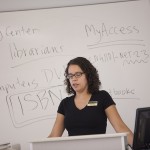Who it’s for: Librarians as well as other teaching faculty interested in developing clear-cut information literacy learning outcomes.
The Concept: What does an information literate student look like by the time they graduate? The answer depends on the discipline. A theater graduate’s skills, fluencies, and habits of mind will naturally be quite different from those of a nursing graduate, which will in turn differ significantly from a criminal justice major. This project is an attempt to help librarians work with disciplinary faculty in their own institutions to articulate discipline-specific learning outcomes. (see OVERVIEW page for further information)
The Process: We suggest convening a series of conversations with disciplinary faculty, using a focus group format. These conversations can be used to generate the information needed to develop a set of matrices similar to examples provided on this website. (see STEPS IN THE PROCESS page for further information)
The Goal: The disciplinary matrices resulting from the focus group conversations should be seen, we suggest, as the beginning of a larger process to establish a deeper and more collaborative approach to information literacy instruction in the disciplines. Having worked with disciplinary faculty to articulate learning outcomes within a particular discipline, librarians will then be optimally positioned to serve as “curricular consultants” who can help disciplinary faculty identify areas for improving learning opportunities and assignments and new places for librarians’ own instructional efforts.
The Framework: We’ve drawn on two complementary approaches to conceptualizing information literacy to develop our model. See detailed explanation on our “Matrices” page.




